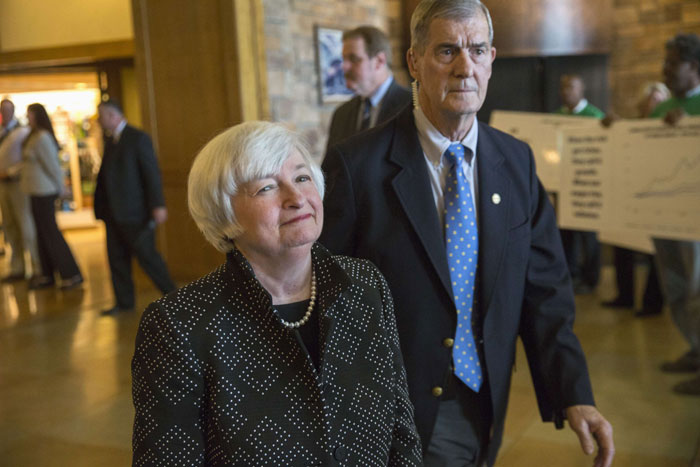Janet Yellen has told the Jackson Hole Economic Policy Symposium in Jackson Hole, Wyoming that the US jobs data is sending mixed signals.
AFP
Federal Reserve chair Janet Yellen said on Friday that the US jobs market has not yet fully recovered, but acknowledged that data is sending mixed signals, spurring debate over inflationary pressures.
In a speech to leading central bankers in Jackson Hole, Wyoming, Yellen, who has kept Fed policy expansive due to perceived excess slack in the jobs market, gave no clear new signs for monetary policy.
Alluding to the rising pressure from so-called inflation hawks inside and outside the Fed to begin tightening policy, she admitted that analysing the data has been "especially challenging recently".
The hawks argue that the sharp fall of the jobless rate to 6.2% is a clear foretoken of inflation and want the Fed to move forward its timeline for an interest rate hike next year.
While agreeing that the data is sending mixed signals, Yellen did not embrace the argument that a burst of inflation is looming and demands a decisive policy adjustment, like moving forward an interest rate hike to early 2015 from later in the year.
There still remains "considerable uncertainty about the level of employment," she told the Fed's annual central banking symposium, according to the text of her remarks.
"There is no simple recipe for appropriate policy in this context."
Yellen picked through the various arguments over what the seemingly contradictory data says: the faster-than-expected fall in the jobless rate to 6.2% from 7.3% a year ago, against the persistently extremely low labor force participation rate since the Great Recession, just 62.9%.
Inflation hawks, like Philadelphia Fed chief Charles Plosser, a member of the policy-setting Federal Open Market Committee, argue that the jobless rate decline is real.
They downplay the low participation rate as a sign of not cyclical joblessness but fundamental changes in the labour market, including demographic shifts.
Yellen agreed that there have been some structural changes that have affected the way the labour market signals tightening through indicators such as part-time work, the number of people leaving jobs, and wage gains - which have been virtually insignificant since the recession ended in 2009.
But she insisted that the combined data that the Fed is reviewing suggests that the jobless rate decline "somewhat overstates" labour market improvements.

